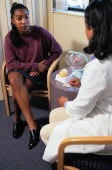- 8 Ways to Increase Dopamine Naturally
- 7 Best Breads for Maintaining Stable Blood Sugar
- Gelatin vs. Collagen: Which is Best for Skin, Nails, and Joints?
- The Long-Term Effects of Daily Turmeric Supplements on Liver Health
- Could Your Grocery Store Meat Be Causing Recurring UTIs?
- Are You Making This Expensive Thermostat Error This Winter?
- Recognizing the Signs of Hypothyroidism
- 10 Strategies to Overcome Insomnia
- Could Artificial Sweeteners Be Aging the Brain Faster?
- Techniques for Soothing Your Nervous System
Two Key Questions May Reveal Depression in Cancer Patients


MONDAY, Sept. 23A simple two-question survey can accurately screen cancer patients for depression, according to a new study.
The survey asks patients whether, in the last two weeks, they have experienced little interest or pleasure in doing things, or felt down, depressed or hopeless. The patients are given a score based on their answers to the two questions.
For each question, a patient can answer: not at all (worth zero points), several days (1 point), more than half the days (2 points), or nearly every day (3 points). Patients who score a total of at least 3 points on both questions are considered to be at risk for having depression.
The screening test was assessed in a study that included 455 cancer patients undergoing radiation therapy at 37 centers in the United States. They were surveyed before or within two weeks of undergoing their first radiation treatment. Of the participants, 16 percent screened positive for depression.
The researchers found that the two-question screening test was just as accurate in screening for depression as a longer nine-question screening test, according to the findings, which are scheduled for presentation Monday at the annual meeting of the American Society for Radiation Oncology.
“We found that a two-question survey can effectively screen for depression,” Dr. William Small Jr., chair of the department of radiation oncology of Loyola University Medical Center, said in a Loyola news release. “We hope this will prompt more centers to screen for depression, and to refer patients for treatment when necessary.”
He and his colleagues also found that 78 percent of radiation therapy centers routinely screen patients for depression, with half screening at the initial visit. Sixty-eight percent of radiation therapy facilities offered mental health services. However, 67 percent of sites had only social workers available; 22 percent offered psychiatrists, and 17 percent offered psychologists.
“We think the results of this large, nationwide trial will have a major impact on how cancer patients are screened for depression,” Small said.
Because this study was to be presented at a medical meeting, the data and conclusions should be viewed as preliminary until published in a peer-reviewed journal.
More information
The U.S. National Institute of Mental Health has more about depression and cancer.
Source: HealthDay
Copyright © 2026 HealthDay. All rights reserved.










